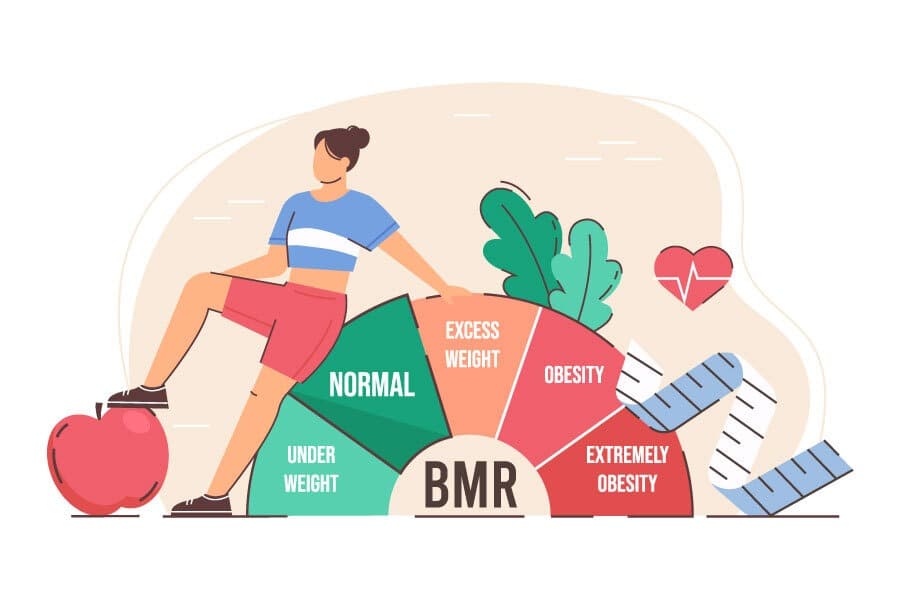What is BMR (Basal Metabolic Rate)?

MyFitnessCoach
November 2, 2023
Have you ever wondered why some people seem to eat whatever they want and not gain weight, while others struggle to get rid of those extra fats despite strict diets and intense workouts? The answer to this puzzle lies in a concept known as BMR, or Basal Metabolic Rate. While the term may sound complex, understanding BMR is crucial in explaining the science behind our bodies' energy expenditure and, ultimately, our weight management. In this article, we'll break down the concept of BMR in simple terms, explaining what it is, how it's calculated, and why it's so important for your overall fitness and health.
Why is BMR Important?
Understanding your BMR is essential for several reasons:
- Weight Management: Your BMR is a key factor in determining how many calories you need to maintain, lose, or gain weight. If you consistently consume more calories than your BMR, you'll gain weight, while consuming fewer calories than your BMR will lead to weight loss. Knowing your BMR allows you to create a personalized and effective nutrition plan.
- Nutrition Planning: BMR is the foundation upon which you can build a sustainable diet plan. It helps you set calorie goals that are appropriate for your unique needs, ensuring that you don't overeat or deprive yourself of essential nutrients.
- Health Monitoring: BMR is an indicator of your overall health and can help identify underlying issues. A significantly lower or higher BMR than expected might be a sign of a metabolic disorder or hormonal imbalance that requires medical attention.
- Fitness Goals: If you're into fitness, understanding your BMR can be a game-changer. It provides insight into how many calories you need to support your training and recovery, helping you reach your fitness goals more effectively.
How is BMR Calculated?
Calculating your BMR typically involves the use of an equation. There are various formulas available, but one of the most commonly used is the Mifflin-St Jeor Equation. The equation is based on your age, gender, weight, and height. Here's a simplified version of the Mifflin-St Jeor Equation for calculating BMR:
For Men:
BMR = 10 x weight (kg) + 6.25 x height (cm) - 5 x age (years) + 5
For Women:
BMR = 10 x weight (kg) + 6.25 x height (cm) - 5 x age (years) - 161
Let's break this down step by step:
- Weight (in kilograms): This is your body weight in kilograms. If you know your weight in pounds, you can convert it to kilograms by dividing by 2.2046.
- Height (in centimeters): Your height in centimeters. If you know your height in inches, you can convert it to centimeters by multiplying by 2.54.
- Age (in years): This is your age in years.
- Gender: You'll use the appropriate equation based on your gender.
Once you've calculated your BMR, you'll have a baseline number that tells you how many calories your body needs at rest. This is the energy required to maintain your bodily functions without any additional physical activity.
Calculating BMR is just the first step. To determine your daily calorie needs, you'll need to factor in your activity level, which is known as your Total Daily Energy Expenditure (TDEE). The TDEE takes into account the calories burned through activities like walking, exercising, and daily tasks. The relationship between BMR and TDEE can be summed up like this:
TDEE = BMR + Calories burned through physical activity and digestion
To get a more precise estimate of your daily calorie needs, you can use multipliers based on your activity level:
- Sedentary (little to no exercise): BMR x 1.2
- Lightly active (light exercise or sports 1-3 days a week): BMR x 1.375
- Moderately active (moderate exercise or sports 3-5 days a week): BMR x 1.55
- Very active (hard exercise or sports 6-7 days a week): BMR x 1.725
- Extra active (very hard exercise or a physically demanding job): BMR x 1.9
It's important to note that these equations provide estimates, and individual variations can occur. The best way to determine your exact calorie needs is through monitoring your food intake and making adjustments as needed.
Factors Influencing BMR
Several factors can influence your BMR. These include:
- Age: BMR tends to decrease with age, primarily because of a decrease in muscle mass and a slower metabolism. This is why older individuals often find it more challenging to maintain or lose weight.
- Gender: Men typically have a higher BMR than women because they tend to have more muscle mass, which requires more energy to maintain.
- Weight: Heavier individuals tend to have a higher BMR because it takes more energy to support a larger body.
- Height: Taller individuals usually have a higher BMR because it takes more energy to maintain their greater surface area.
- Muscle Mass: Muscle burns more calories at rest than fat, so individuals with more muscle have a higher BMR.
- Genetics: Genetic factors can play a role in determining your BMR. Some people are naturally predisposed to have a higher or lower metabolic rate.
- Hormones: Hormonal imbalances, such as those associated with thyroid disorders, can affect BMR.
- Environmental Factors: Factors like temperature and altitude can impact BMR. Colder temperatures may increase BMR to maintain body temperature, while higher altitudes can slightly decrease it.
- Diet: Extreme calorie restriction and crash diets like fad diets can slow down your metabolism and lower your BMR. This is the body's way of conserving energy during periods of food scarcity.
- Medical Conditions: Certain medical conditions, such as Cushing's syndrome or anorexia nervosa, can affect BMR.
How to Use Your BMR for Weight Management?
Now that you understand the concept of BMR and how to calculate it, you can use this knowledge to help manage your weight more effectively. Here's how:
- Determine Your Goal: Decide whether you want to lose, maintain, or gain weight. Your goal will determine your calorie intake.
- Calculate Your TDEE: Use your BMR as a starting point and apply the appropriate activity level multiplier to calculate your TDEE.
- Set Calorie Goals: Depending on your goal, adjust your calorie intake accordingly. To lose weight, create a calorie deficit by consuming fewer calories than your TDEE. To gain weight, aim for a calorie surplus.
- Monitor and Adjust: Keep track of your progress and make adjustments as needed. If you're not seeing the desired results, reassess your calorie intake and activity levels.
- Focus on Overall Health: While managing your weight, remember to prioritize your overall health. Choose nutrient-dense foods, stay hydrated, and engage in regular physical activity for optimal well-being.
Understanding your BMR is key to maintaining a healthy weight and lifestyle. It serves as a fundamental tool in creating personalized nutrition and fitness plans, helping you make informed choices about your calorie intake and energy expenditure. By knowing your BMR and how it influences your body's energy needs, you can take proactive steps toward achieving your health and fitness goals. Remember that while BMR is an essential factor in weight management, it's just one piece of the puzzle. A holistic approach that includes a balanced diet, regular exercise, and a healthy lifestyle is crucial for overall well-being.

Ready to take control of your health and fitness journey? Download the MyFitnessCoach app now and unlock the power of understanding your Basal Metabolic Rate (BMR). With our easy-to-use BMR calculator, you can get a clear picture of your body's energy needs, helping you set personalized goals for weight management and overall well-being. Take the first step towards a healthier lifestyle today with MyFitnessCoach and make informed choices to achieve your fitness aspirations.
Frequently Asked Questions
Similar Articles
Stay informed with these similar articles.

MyFitnessCoach
October 18, 2023
What Does Body Goals Mean? A Path to a Healthy Lifestyle
In the world we live in now, lots of people talk about "body goals," which means having a body that's seen as perfect. On social media, in magazines, and on TV, we see lots of pictures of people with what seems like perfect bodies, which makes us feel like we have to look like them. But the real meaning of "body goals" is more than just looking good. It's about taking care of your whole self, not just how you look. In this article, we will discuss what does body goals actually mean and how you can achieve your body goals. Let’s get started:
.webp&w=3840&q=75)
MyFitnessCoach
September 5, 2023
How Much Protein in an Egg | The Nutritional Power
Eggs have long been a breakfast favorite for many, and for good reason. They're not only delicious but also packed with essential nutrients, making them a versatile and nutritious addition to your diet. One of the most common questions about eggs is, "How much protein is in an egg?" In this comprehensive guide, we'll delve into the world of eggs and explore their protein content, nutritional benefits, and how they can contribute to a balanced diet.

MyFitnessCoach
May 18, 2023
Fitness Guide: How Do I Start A Weight Loss Journey
Ready to start on a life-changing weight-loss journey? Congratulations for taking the first step towards being a better and happier version of yourself! Starting off a weight-loss journey may be both satisfying and stressful. With so much information available, having a well-defined plan and trusted assistance in achieving your goals is important. This article will help you start your weight-loss journey and achieve the results you desire.
